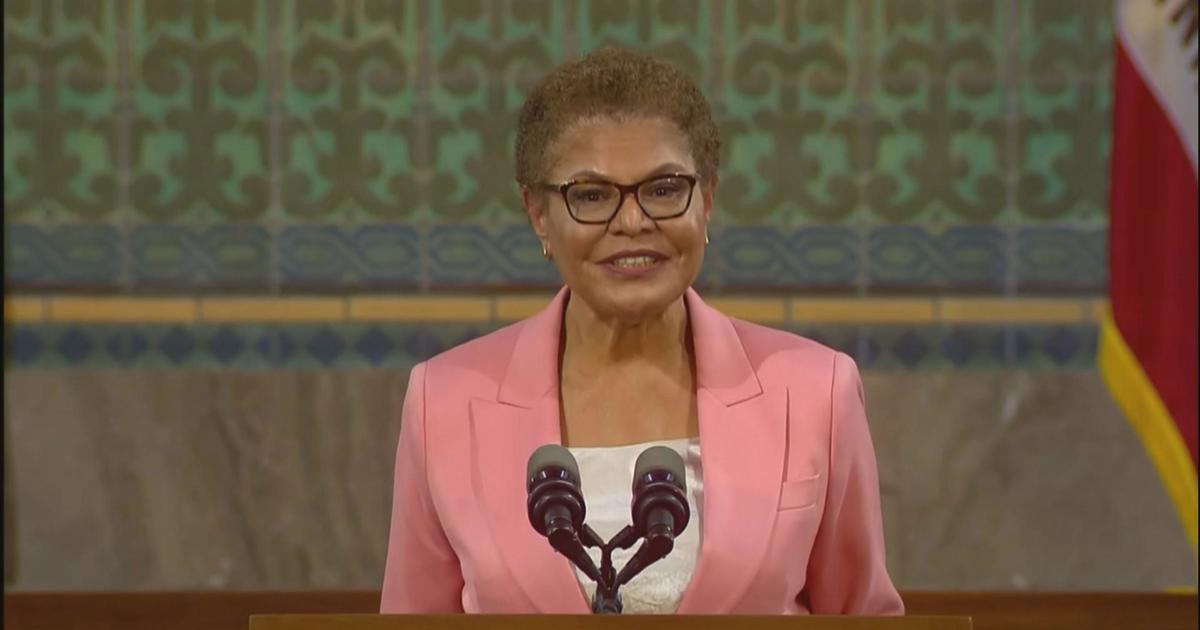Report: CalPERS Doled Out Bonuses, Raises
SACRAMENTO (AP) — As its investment portfolio was losing nearly a quarter of its value, the country's largest public pension fund doled out six-figure bonuses and substantial raises to its top employees, an analysis by The Associated Press has found.
Podcast
KNX 1070's Ed Mertz Reports On America's Largest Pension Fund
Board member Tony Olivera said the California Public Employees' Retirement System tried to reduce the bonuses but was under contractual obligations to pay them.
CalPERS' plunging value came as stock values tumbled around the world, the state's economy suffered its worst decline in decades and basic state services faced severe budget cuts.
Virtually all of CalPERS' investment managers were awarded bonuses of more than $10,000 each, with several earning bonuses of more than $100,000 during the 2008-09 fiscal year. The cash awards were distributed as the fund lost $59 billion.
Steve Deutsch, director of pensions and endowment at Morningstar Inc., said many public pension plans award performance bonuses, and called CalPERS' performance during 2008-09 "middle of the road."
"It's absolutely very widespread, but very low profile in terms of being acknowledged, discussed, or disclosed by the plans," Deutsch said.
CalPERS spokesman Brad Pacheco said bonuses are based on the fund's performance over five years, not just the year immediately preceding the bonus, in order to encourage managers to seek long-term investments rather than short-term gains. He said bonuses in the 2008-09 fiscal year were 50 percent lower than in 2006-07 and that the market declines will continue to dampen bonuses in future years.
"Incentives are part of total compensation and critical to the fund's long-term success as well as recruitment and retention of skilled investment professionals," Pacheco said in an e-mail.
Bonuses also were paid to employees who are not part of the fund's investment team, including a public affairs officer who received bonuses of nearly $19,000 a year two years in a row and a human resources executive who received bonuses topping $16,000 both years.
The number of CalPERS executives making $200,000 a year or more rose from 13 to 15 over the two-year period. Those employees received an average salary raise of 12 percent and an average bonus of $115,705 in the 2007-08 fiscal year and $63,311 in 2008-09, according to the AP's inquiry into CalPERS compensation.
Senior investment officers responsible for segments of the portfolio seeing the steepest declines were among those rewarded, due in large part to the fund's long-term bonus system.
Real estate was the hardest-hit investment category in the CalPERS portfolio during the 2008-09 fiscal year, suffering from the same property devaluations felt across the country. That portfolio lost 47.9 percent of its value over the fiscal year.
CalPERS awarded the portfolio's senior investment manager, Ted Eliopoulos, a $93,941 bonus on top of his $333,124 salary, which was 8 percent higher than the previous year.
According to CalPERS' annual report, the global equity portfolio saw a 26 percent decline in U.S. stocks and a 32.4 percent drop in international stocks during 2008-09. Eric Baggesen, the senior investment officer for global equity, received a 6 percent raise, bumping his salary up from $300,000 to $318,000 in the 2008-09 year. He also received bonuses totaling $254,186 over the two-year period.
The AP obtained the data from CalPERS through a California Public Records Act request and analyzed the compensation of employees earning salaries of at least $90,000 per year in both fiscal years. CalPERS says bonuses for 2009-10 are being determined.
For the sake of consistency, employees who worked only one of the two fiscal years were not included in the AP's overall data analysis.
Like all state employees, those at CalPERS were subject to furloughs in the last half of the 2008-09 fiscal year, which amounted to a 9.2 percent temporary salary decrease over the final five months. Those furlough reductions were not taken into account in the analysis because they did not affect official salaries used to determine raises and pensions.
Employees of the pension fund are paid salaries and bonuses out of the fund's investment returns. The salaries are not paid directly by California taxpayers, but they come from the same pot as pension payments.
Taxpayers are on the hook to cover the deficit between returns generated by investments and what is owed to state retirees.
Earlier this year, the pension fund's board voted to take between $480 million and $600 million more from the state to make up for investment losses and the fact that retirees are living longer and receiving more pension payments. Part of that will come from the state's general fund, which faces a $19 billion deficit.
CalPERS does not need legislative approval to enact an increase in the state's pension contribution rate.
CalPERS' board of directors recently voted to allow the board to defer, cut or eliminate performance awards if the fund's fiscal year absolute return is less than zero percent, or for any other reason, Pacheco said. He added that investment managers' salaries were frozen in the most recent fiscal year, 2009-10.
Board member Olivera said the CalPERS board tried to reduce bonuses for 2008-09 but was "contractually compelled" to honor them.
"But we have taken steps now to make sure that can't happen in the future," Olivera said.
However, the board voted Sept. 15 to give the chief investment officer and CEO authority to award bonuses of as much as 20 percent of salary to investment managers they're worried about losing to the private sector. Employees would have to return the bonuses if they leave CalPERS within two years.
"It's not that they're just piling on bonuses; this is key to retaining staff," Pacheco said in an interview.
Signs of trouble in the markets were apparent during the 2007-08 fiscal year, as the national recession began to deepen. The Standard & Poor's 500 index declined by 14.8 percent in 2007-08 and 28.2 percent in 2008-09, while CalPERS' overall value dropped by 5.1 percent and 24.8 percent respectively.
In the group the AP examined, base salaries in 2008-09 ranged from $94,056 to $349,610, with 15 earning more than $200,000.
Bonuses ranged from $5,957 to $114,083, although bonuses were lower across the board in 2008. That meant the total compensation for most employees declined from the previous fiscal year.
The salaries and bonuses were awarded as public pension plans have come under increased scrutiny, especially for their growing unfunded liabilities -- the difference between the current value of the investment portfolio and the dollar amount promised to state retirees.
CalPERS, which serves more than 1.6 million public employees, retirees and their families, estimated its unfunded liabilities at $38.6 billion on July 1, 2008, the most recent official estimate available. But a study commissioned by Gov. Arnold Schwarzenegger and released by Stanford University in April estimated CalPERS' unfunded pension liability at $239.7 billion. The two groups used different accounting standards to estimate the unfunded liabilities.
Schwarzenegger has said California's current pension system is unsustainable and has called for pension reforms, saying he will not sign a state budget this year without them.
(© Copyright 2010 The Associated Press. All Rights Reserved. This material may not be published, broadcast, rewritten or redistributed.)



